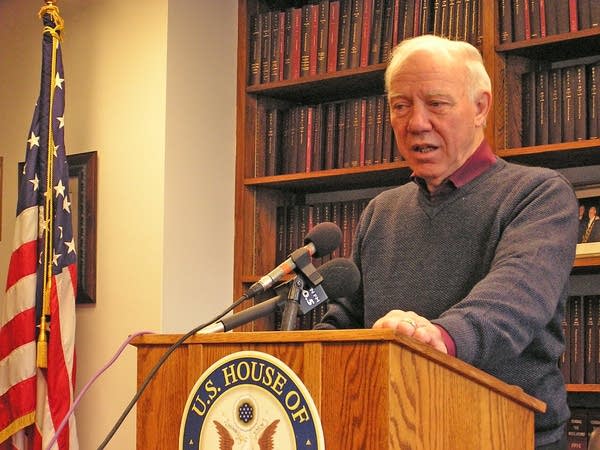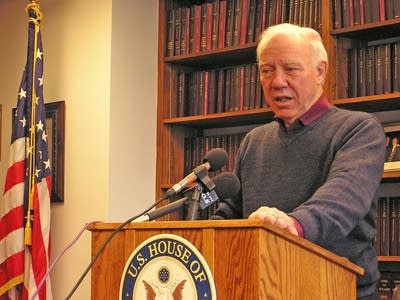Oberstar takes charge
Go Deeper.
Create an account or log in to save stories.
Like this?
Thanks for liking this story! We have added it to a list of your favorite stories.

Even in the minority, Jim Oberstar has been a powerful voice on the House Transportation and Infrastructure Committee. It pays for highways, airports, navigation, and water and sewage projects.
Now he'll set the agenda.
First up will be clearing a backlog of bills. There's a water resources development act that's been languishing in Congress, Oberstar says, for six years.
"It's important, and I will add a provision to accelerate dredging in the harbors and interconnection channels in the Great Lakes," Oberstar says.
Turn Up Your Support
MPR News helps you turn down the noise and build shared understanding. Turn up your support for this public resource and keep trusted journalism accessible to all.

That's because an ongoing drought dropped Great Lakes water levels so low that ore ships leave Duluth some 4,500 tons below capacity to avoid hitting bottom.
Oberstar says the House could pass the $8-billion bill as soon as next week, or it could wait until the majority is seated in January.
He plans to revive a 20-year-old bill for a rebuilt and expanded lock at Lake Superior's outlet in Sault Ste. Marie, Michigan.
Oberstar plans to create a joint authority to manage the St. Lawrence Seaway in partnership with Canada, to improve that system and lower shipping costs.
And he plans improvements to locks along the Mississippi river.
If we can spend $20 billion in Iraq, unaccounted for, on building water and sewer and waste treatment facilities, and trying to regenerate their electrical generating plants, then we can do it here at home.
Oberstar has his sights set on an upcoming re-authorization of the Federal Aviation Administration. He says he'll want money for airports large and small.
"We need to make sure that airports like Bigfork and Grand Rapids and others in the general aviation airport category continue to have the resources they need to keep our small communities competitive, to create jobs," Oberstar says. "And I will insist that we do so in the re-authorization of FAA."
Oberstar says he will renew a state revolving loan fund for water and sewage treatment plants and sewer lines. He says a $20 billion bill has been stuck for years because it requires union wages during project construction.
"If we can spend $20 billion in Iraq, unaccounted for, on building water and sewer and waste treatment facilities, and trying to regenerate their electrical generating plants, then we can do it here at home," Oberstar says.
Not on the immediate agenda are highways, bridges or bicycle paths. That's because the Federal Highway Bill passed in 2005 isn't up for renewal for another three years.
Oberstar says he's looking at how Congress can change under Democratic majority. He says Republicans kept the House in session just two days a week, with compressed committee hearings and overlapping meetings.
"That's why midnight bills come to the House floor, shaped by the House Republican leadership outside of the Rules Committee," says Oberstar. "We have to put an end to that, have transparency in our legislative process, hold hearings that are in-depth on issues that are of importance to this country."
Chairing a Congressional Committee is powerful, especially in the House, according to Garrick Percival, an assistant professor of political science at the University of Minnesota-Duluth. As chair, Percival says, Oberstar can pretty much call the shots.

"If you the majority on the Committee, on the House floor, you can do pretty much what ever you want, as long as you can get your fellow democrats to vote with you," Percival says. "And so, the power of a Chairman in the House is much more so than in the Senate."
But, the power is still limited by the President's veto, and by - at best - a narrow lead for Democrats in the Senate, where a minority filibuster can tie up bills.
Despite a clear majority in the House and a possible one in the Senate, Oberstar is calling for peaceful cooperation with the Republican minority. He says there's a tradition of cooperation on the House Transportation Committee that he says will continue.
"I don't know of Democratic roads or Republican bridges. If we work together we can build all-American roads and all-American bridges," says Oberstar. Oberstar also looks forward to working with other regional committee chairs: Collin Peterson, who's in line to chair the House Agriculture Committee, and northwest Wisconsin's Congressman Dave Obey, who's next at the head of Appropriations.



